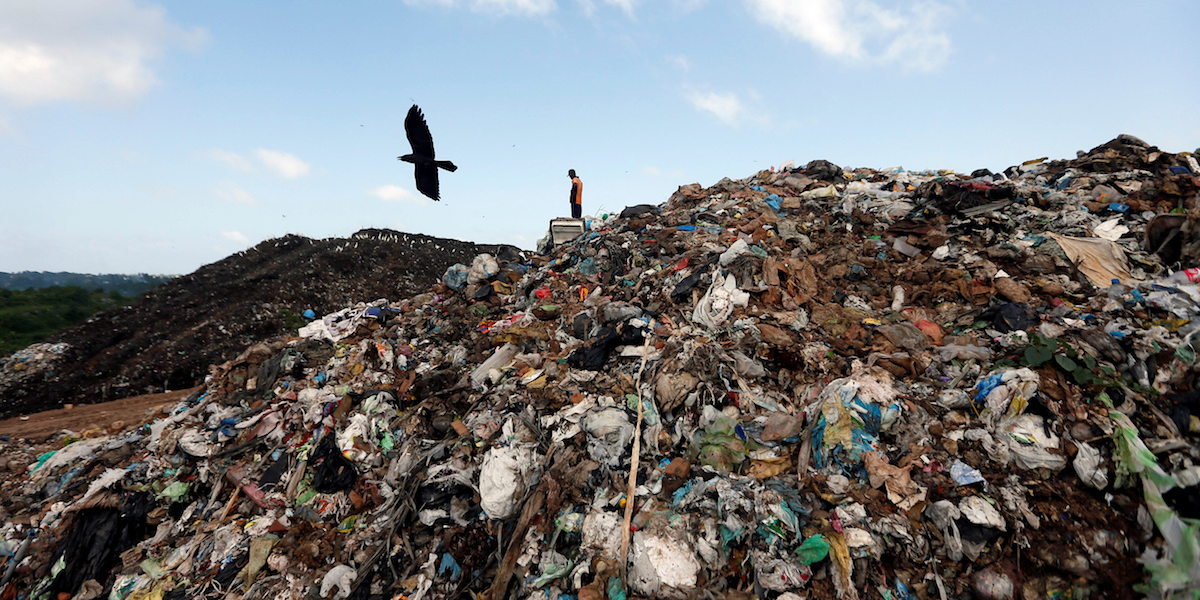- Western countries have been sending their recycling to developing nations in Southeast Asia for decades.
- Officials in the recipient countries complain that the trash they receive is improperly labeled, and contains other types of garbage that they can’t recycle.
- On Tuesday, Sri Lanka ordered the return of 111 shipping containers to the UK, which it says contains waste like rotten human organs, Agence France-Presse (AFP) reported.
- Authorities claim that a total of 241 containers of trash have been illegally sent to Sri Lanka since 2017.
- Visit Business Insider’s homepage for more stories.
Sri Lanka has ordered the return of hundreds of tons of trash to Britain, the latest move in Southeast Asia’s campaign to end its role as a dumping ground for garbage made in the West.
According to Sri Lankan officials, the stinking containers include mounds of foul waste – including rotten human remains – and represent a breach of the terms on which the trash was shipped.
Sri Lankan customs officials accused the UK of illegally importing hazardous waste into the country since at least 2017 by wrongly labeling it as metal recycling, Agence France-Presse (AFP) reported.
Authorities discovered the waste after people complained of the stench from 111 abandoned containers in a port in Colombo, Sri Lanka’s capital city, the news agency reported.
They are believed to contain mortuary waste, which include human organs that had been left unrefrigerated for the past two years, AFP said.

Those containers will be returned to Britain, Sunil Jayaratne, a spokesman for Sri Lanka's customs office, told AFP.
Sri Lankan officials did not give an estimate for the weight of the trash. But given the size and carrying capacity of 111 containers, it is likely to easily come to several hundred tons, and more likely several thousand.
A typical shipping container can carry as much as 26 tons, and weighs four tons even when empty. If all 111 containers were full, that would equate to around 2,900 tons of trash.
A shipment of trash sent back to Canada by the Philippines weighed 1,500 tons spread across 69 containers.

After being alerted to the stinking British trash, Sri Lankan officials looked further, and found 130 other containers of trash that had been imported into Sri Lanka since 2017, AFP reported. It's not clear where those ones came from.
Authorities found mattresses and carpets stuffed among the waste, which violates international laws on shipping hazardous material, Sri Lankan news site News First reported, citing Ajith Weerasundara, director of hazardous waste management at the country's Central Environmental Authority.
Fifty-seven of these containers have already been re-exported to their originating countries, and many others were taken to the Katunayake Free Trade Zone in western Sri Lanka, News First reported. Officials plan to send the rest of the containers back.
The containers have been contaminating the water and polluting the air at Katunayake, AFP reported.
"This is a well-organized racket that has been going on since 2017," an unnamed official at Sri Lanka's finance ministry told AFP.
Read more: Staggering photos show one small town covered in 19,000 tons of plastic waste

The global trash war
Sri Lanka's move is the latest in a series of actions by Southeast Asian countries to send illegally-imported trash back to its home countries, which are mostly in the West.
Broadly, rich Western countries - like the UK, US, Canada, and Australia - sign contracts with companies in developing Southeast Asian countries - like Sri Lanka, Malaysia, and the Philippines - to dispose of their trash.
Such deals have been taking place for at least 25 years, particularly for plastic waste labeled for sorting or recycling.
Because many developing nations in Southeast Asia lack environmental regulations as stringent as those in Western nations, it's easier to dispose of their trash there.

However, officials in the recipient nations have been saying that the trash they receive is often incorrectly labeled, and reported find inappropriate items mixed in with the useful plastic.
A prominent example was in May 2019, when the Philippines shipped the 1,500 tons of trash back to Canada after a diplomatic dispute. The Asian country's firebrand president, Rodrigo Duterte, threatened to sail to Canada personally and leave the trash there.
Malaysia also said it would return 3,300 tons of plastic trash to the US, UK, Canada and Australia that same month.

